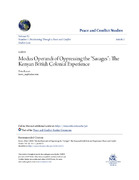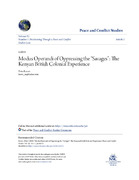| dc.contributor.author | Peter, Karari | |
| dc.date.accessioned | 2018-11-14T06:46:38Z | |
| dc.date.available | 2018-11-14T06:46:38Z | |
| dc.date.issued | 2018-05 | |
| dc.identifier.citation | Karari, Peter (2018) "Modus Operandi of Oppressing the “Savages”: The Kenyan British Colonial Experience," Peace and Conflict Studies: Vol. 25 : No. 1 , Article 2. Available at: https://nsuworks.nova.edu/pcs/vol25/iss1/2 | en_US |
| dc.identifier.uri | https://karuspace.karu.ac.ke/handle/20.500.12092/2173 | |
| dc.description.abstract | Colonialism can be traced back to the dawn of the “age of discovery” that was pioneered by the Portuguese and the Spanish empires in the 15th century. It was not until the 1870s that “New Imperialism” characterized by the ideology of European expansionism envisioned acquiring new territories overseas. The Berlin Conference of 1884-1885 prepared the ground for the direct rule and occupation of Africa by European powers. In 1895, Kenya became part of the British East Africa Protectorate. From 1920, the British colonized Kenya until her independence in 1963. As in many other former British colonies around the world, most conspicuous and appalling was the modus operandi that was employed to colonize the targeted territories. Part one of this article discusses the tactics of subjugation used by the British to oppress, humiliate, subdue, conquer and colonize the Kenyan communities. These tactics included crown land ordinances; capitalist estate production; the establishment of African reserves and squatter systems; the formation of the “white” highlands; the imposition of taxes and forced labor; the imposition of the pass or Kipande System; missionary churches; the declaration of a state of emergency; military operations; villigilization; ethnic divide and rule; and flogging, torture, incarceration and execution. The findings offer a comparative template about the tactics used by the British in other colonies. Part two of this study addresses a new focus about the link between
British colonialism and ethnopolitical conflicts in Kenya. This presents a new avenue for more focused interventionism in addressing such conflicts. Part three of this study introduces a new important inquiry about “what next?” for the victims and survivors of British colonialism in Kenya. The argument is that the study of British colonialism cannot be complete without interrogating transitional justice for the victims and survivors of colonial atrocities. The focus on transitional justice introduces a new debate about the need for collaborative action in facilitating restitution, reparations, healing, and closure for victims and survivors of British colonial atrocities. Although resistance to colonial invasion was experienced in many parts of Kenya, this study concentrates on the Mount Kenya region where it was most intensive and dominant | en_US |
| dc.language.iso | en_US | en_US |
| dc.publisher | Peace and Conflict Studies | en_US |
| dc.subject | Peace and Conflict Studies; British Colonialism; Kenya, British, Colonial Styles, Ethnopolitical Violence, Transitional Justice | en_US |
| dc.title | Modus Operandi of Oppressing the “Savages”: The Kenyan British Colonial Experience | en_US |
| dc.type | Article | en_US |

